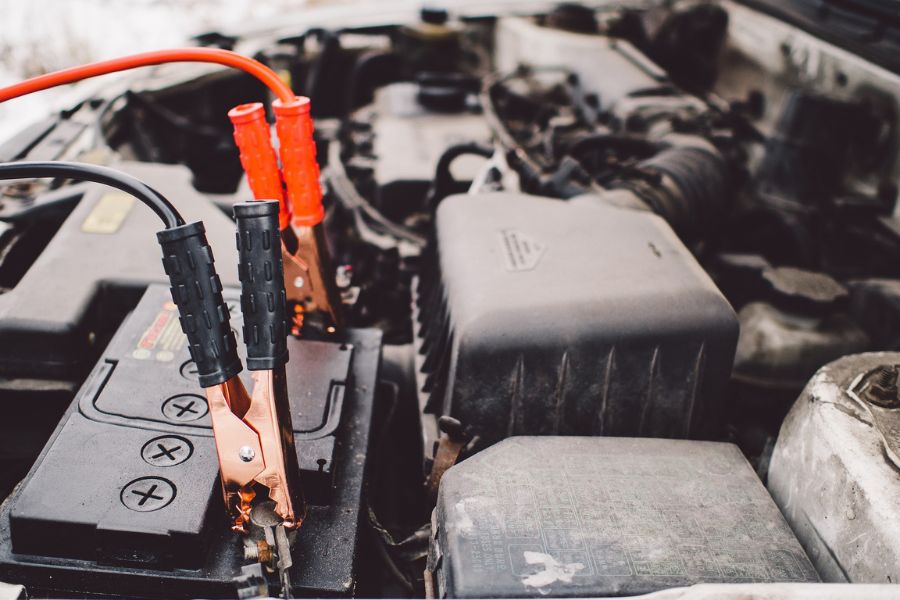Quick Navigation
Did you know that cold weather is a battery killer? In the wintertime, it can take twice as long to get your car started in the morning because of the frigid temperatures. If you have a lead-acid battery, this may be even more true.

Car batteries are not designed to operate at extreme temperatures. A typical car battery can lose up to a quarter of its power when the temperature drops by 20 degrees.
If you live in an area where the temperature dips below freezing during the winter, your battery may be running at only 75% efficiency.
Car batteries do have some latitude for operating at colder temperatures, but they are not made to work in cold weather.
The main problem with cold weather is that it reduces the amount of electrolytes and water in the battery.
How Your Car Battery Works
Car batteries are optimized for working at regular temperatures. The lead plates inside the batteries are covered with a layer of sulfate during normal use.
The sulfate acts as a shield to protect the lead plates from damage or corrosion.
The problem with cold weather is that it reduces the amount of electrolytes and water in the battery.
When the temperature drops, the sulfate on the lead plates begins to freeze and separate from them.
At this point, it becomes critical that the car battery be recharged before it has completed its natural dehydration cycle.
The best way to recharge a car battery is with a car battery charger. Many people have a small trickle-type power source that plugs into their cigarette lighter sockets.
This method is not recommended because it can leave the lead plates in a partially discharged state.
Why Your Car Battery Dies in Winter
Just about every potential problem can be traced back to a combination of temperature and water.
Water is the electrolyte in your battery that allows current to flow through it. When it’s cold outside, the water particles in your battery freeze.
This causes a buildup of ice on the plates and negative terminal. This stack-up is what gives electrical systems problems during cold weather.
The battery’s water supply will slowly drain out, causing a drop in the electrolyte levels.
This reduces the battery’s ability to conduct electricity. This is what causes problems with your electrical systems.
When the outside temperature drops below freezing, many battery troubles increase significantly.
How to Prevent Your Car Battery From Dying This Winter
- Regular battery checks – The best way to prevent your car battery from dying in the winter is to regularly check the condition of your battery. If you see that your battery fluid level is low. You will also want to ensure that there are no problems with the health of your battery. A good way to check for this problem would be to use a hydrometer. This tool was designed by Hydronics engineers and used by them on their tools at work.
- Park in a garage or underground parking – This will allow your battery to keep the water temperature at a more consistent level. And also protect the battery from any severe weather.
- Use a battery charger – This will also allow your battery to stay at a consistent temperature and continue to receive the required charge level. And powerful battery chargers are also used at work.
- Don’t leave the car idle – Allow your car to warm up before you start using it. This will help the engine maintain a consistent temperature and also protect your battery unit.
Ways to Avoid Some Common Cold-Weather Car Battery Problems
- Know the Lifespan of Your Battery – Most cars use a 12-volt battery. This is the most common car battery in the world. And most of them have an average lifespan of 3-5 years. But depending on your driving habits and the kind of car you own. You might be able to get anywhere from 10 years to a decade out of your battery.
- Check For Corrosion – If you believe there might be problems with corrosion from your battery. Then you can use a solution made up of baking soda and water to help remove it. This mixture can be used anywhere on your car to help remove corrosion.
- Minimize Technological Accessories – No matter how you try to hide them, gadgets are electricity hogs. They use much more power than necessary to operate. So the best way to avoid car battery problems in winter is to minimize the use of these devices.
- Buy a Battery Blanket – This will help to maintain the temperature of your battery. Which is usually stored under the hood of your car. A battery blanket will keep it at a consistent temperature and away from extreme weather conditions.
- Use Battery Disconnects – Car batteries are connected to a car’s electrical system in order for your vehicle to run at optimum levels. But if you are not using these systems on a regular basis. It would be best for your battery if you disconnected them from the circuit board altogether.
Does the Warranty Cover My Car Battery?
It can be confusing to determine if a warranty covers your car battery. Warranties can last for quite some time.
And you can get a replacement for your battery without having to spend any money at all. When you purchase a new battery for your vehicle.
The warranty is usually transferred over to the new battery. It will cover it for just as long as the original one.
Car battery manufacturers will give a full warranty on the car battery. They sell so you can be guaranteed the same quality of service that was given to your original battery.
This is especially true if you buy your battery from a company, that has a good reputation for making quality replacement batteries.
There are some manufacturers that may only give you a limited warranty on their batteries, though.
If you have purchased an extended warranty for your vehicle, then this may make up for the fact that your car battery is not covered by warranty.
Does Cold Weather Affect Electric Vehicle Batteries?
Electric vehicles are made up of a lot of rechargeable batteries. These can be found in the shape and under the hood of the vehicle.
With each individual battery, you will find one inside the vehicle and one in the undercarriage.
They are constantly working together and using energy to provide power to different electrical components on your electric car.
The batteries in your electric vehicle may not handle low-temperature conditions as well as they should do. If you live in a cold climate, this can affect the lifespan of your electric vehicle’s batteries.
Conclusion
Looking for a reliable car for winter driving? A good car can be used year-round in any climate. But you can get even more mileage out of your car by taking a few precautions.
If you want to ensure that your vehicle will still work well, after the first snowfall of the season. There are a few things that you can do to help it out.

With comprehensive experience in writing exceptional quality articles and blogs about cars and related stuff, Daniel is one of the finest bloggers and a hardcore car lover we have. He is an ASE certified technician with an across-the-board experience of 10 years in the industry. He could not help tinkering with anything he got his hands on from a young age, which led to his remarkable career in the automotive repair industry.
When he is not under any hood, you can find him on the water or in the woods to pursue his passion for hunting and fishing. He has been writing for multiple sectors and is a regular contributor to several publications.
He currently owns a Nissan 300ZX TT and a Pearl Yellow but plans to upgrade it to 550 HP. His favorites include the Koenigsegg CCX and Lamborghini Diablo 6.0 VT, but for him, the Ferrari 360 Spider is one of the sexiest cars that exists to date.
Being an avid world traveler, he has spent most of his time analyzing the automotive markets, latest technology, and local favorites to enhance his knowledge base. He is currently living in North Caroline, where it’s all about food and coffee and, of course, cars.








